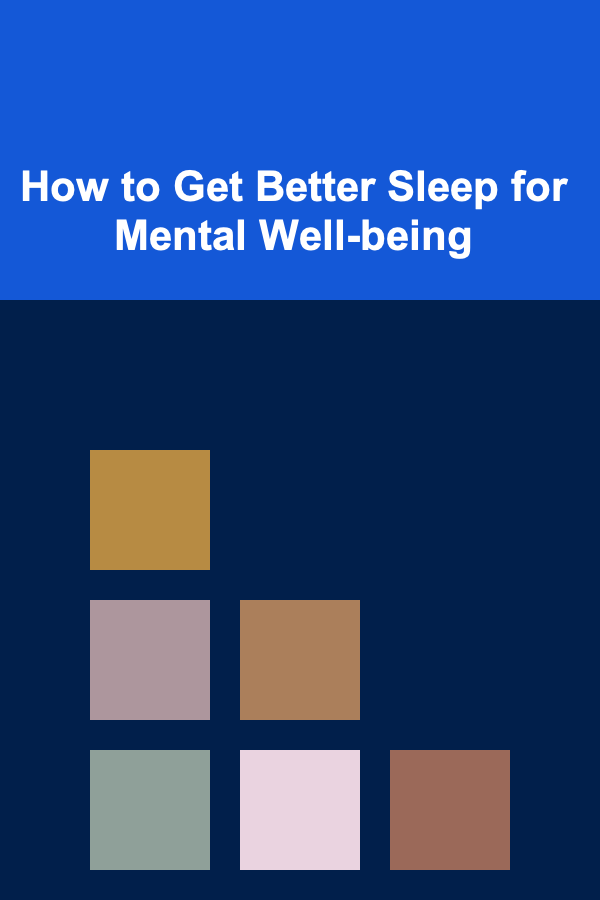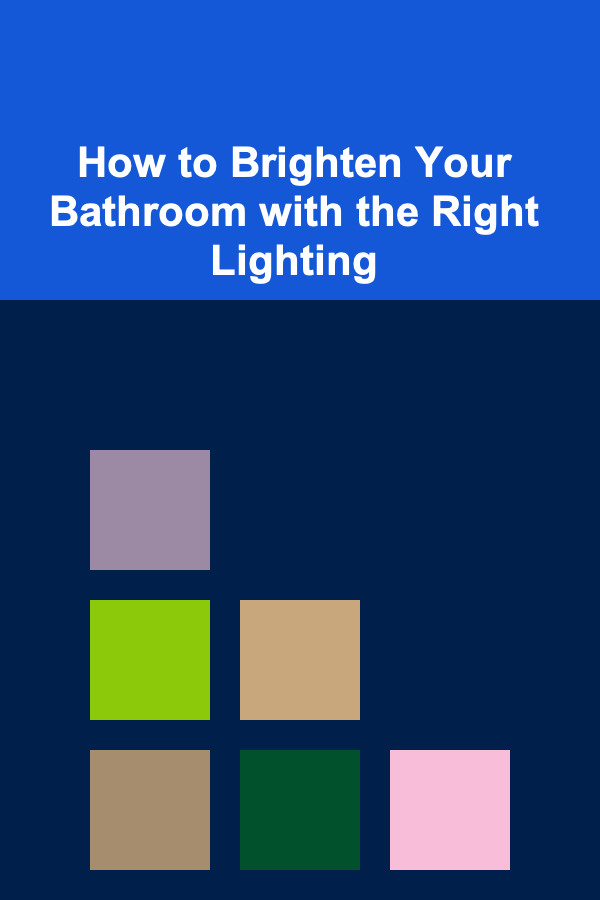
How to Get Better Sleep for Mental Well-being
ebook include PDF & Audio bundle (Micro Guide)
$12.99$6.99
Limited Time Offer! Order within the next:

In our fast-paced and demanding world, sleep often takes a backseat to work, social engagements, and endless to-do lists. However, prioritizing sleep is not a luxury; it's a fundamental necessity for both physical and mental well-being. This article explores the profound connection between sleep and mental health, offering practical strategies to improve your sleep quality and, in turn, enhance your overall mental state.
The Intricate Link Between Sleep and Mental Health
Sleep and mental health are intricately interwoven, functioning as a bidirectional relationship. Poor sleep can exacerbate existing mental health conditions, and conversely, mental health challenges often disrupt sleep patterns. Understanding this connection is the first step towards breaking the cycle and promoting both restful nights and a healthier mind.
The Impact of Sleep Deprivation on Mental Health: When we consistently fail to get enough sleep, a cascade of negative consequences can unfold, significantly impacting our mental well-being:
- Increased Risk of Mood Disorders: Studies have consistently shown a strong correlation between sleep deprivation and an increased risk of developing mood disorders such as depression and anxiety. Lack of sleep can disrupt the delicate balance of neurotransmitters in the brain, including serotonin and dopamine, which play crucial roles in regulating mood.
- Exacerbation of Existing Mental Health Conditions: For individuals already struggling with mental health conditions, poor sleep can worsen symptoms and make them more difficult to manage. For example, insomnia can amplify feelings of anxiety, leading to a vicious cycle of sleepless nights and heightened worry.
- Impaired Cognitive Function: Sleep is essential for cognitive processes such as attention, concentration, memory, and decision-making. Lack of sleep can lead to difficulty focusing, forgetfulness, impaired judgment, and reduced problem-solving abilities, all of which can contribute to feelings of frustration, overwhelm, and diminished self-esteem.
- Increased Irritability and Emotional Reactivity: Sleep deprivation can make us more easily agitated, irritable, and emotionally reactive. Even minor stressors can trigger disproportionate emotional responses, leading to interpersonal conflicts and strained relationships.
- Weakened Stress Resilience: Adequate sleep helps us build resilience to stress. When we're well-rested, we're better equipped to cope with challenges and bounce back from adversity. Conversely, sleep deprivation weakens our stress response system, making us more vulnerable to the negative effects of stress.
- Increased Risk of Substance Abuse: Some individuals turn to alcohol or drugs as a way to self-medicate and cope with the symptoms of sleep deprivation, such as anxiety and difficulty relaxing. This can lead to a dangerous cycle of substance abuse and further sleep disruption.
Mental Health Conditions That Can Disrupt Sleep: Conversely, many mental health conditions can disrupt sleep patterns, creating a challenging feedback loop:
- Anxiety Disorders: Anxiety disorders, such as generalized anxiety disorder (GAD), panic disorder, and social anxiety disorder, are often accompanied by insomnia. Racing thoughts, excessive worry, and physical symptoms of anxiety can make it difficult to fall asleep and stay asleep.
- Depression: Depression can manifest in various sleep disturbances, including insomnia, hypersomnia (excessive sleepiness), and disrupted sleep cycles. Some individuals with depression may experience early morning awakenings, while others may find it difficult to get out of bed in the morning.
- Post-Traumatic Stress Disorder (PTSD): Nightmares, flashbacks, and hyperarousal are common symptoms of PTSD, which can significantly disrupt sleep and lead to chronic insomnia.
- Attention-Deficit/Hyperactivity Disorder (ADHD): Individuals with ADHD often struggle with sleep problems, including difficulty falling asleep, restless sleep, and early morning awakenings. This can be due to hyperactivity, impulsivity, and difficulty regulating attention.
- Bipolar Disorder: Bipolar disorder is characterized by extreme shifts in mood, energy, and activity levels. During manic episodes, individuals may experience a decreased need for sleep, while during depressive episodes, they may experience excessive sleepiness or insomnia.
Establishing a Foundation for Restful Sleep: The Cornerstones of Sleep Hygiene
Sleep hygiene refers to a set of practices and habits that promote healthy sleep. Adopting good sleep hygiene is a crucial first step towards improving your sleep quality and breaking the cycle of sleep deprivation and mental health challenges. Here are some key elements of sleep hygiene:
1. Maintain a Consistent Sleep Schedule
Our bodies operate on a natural 24-hour cycle called the circadian rhythm, which regulates sleep-wake patterns. Maintaining a consistent sleep schedule, even on weekends, helps to synchronize your circadian rhythm and promote more regular and restful sleep.
- Go to bed and wake up at the same time each day: Choose a bedtime and wake-up time that allows you to get 7-9 hours of sleep each night. Stick to this schedule as closely as possible, even on weekends, to reinforce your body's natural sleep-wake cycle.
- Avoid sleeping in excessively on weekends: While it may be tempting to sleep in on weekends to catch up on lost sleep, doing so can disrupt your circadian rhythm and make it harder to fall asleep on Sunday night. Try to limit sleep-ins to no more than an hour or two.
2. Create a Relaxing Bedtime Routine
A relaxing bedtime routine signals to your body that it's time to wind down and prepare for sleep. Engage in activities that help you relax and de-stress in the hour or two before bed.
- Take a warm bath or shower: A warm bath or shower can help to relax your muscles and lower your body temperature, signaling to your brain that it's time for sleep.
- Read a book: Reading a book (not on an electronic device) can help to take your mind off of stressors and promote relaxation.
- Listen to calming music: Relaxing music can help to soothe your mind and body, making it easier to fall asleep. Avoid upbeat or stimulating music.
- Practice relaxation techniques: Techniques such as deep breathing, meditation, yoga, or progressive muscle relaxation can help to reduce stress and promote relaxation.
- Avoid screen time before bed: The blue light emitted from electronic devices can interfere with the production of melatonin, a hormone that regulates sleep. Avoid using smartphones, tablets, computers, and televisions for at least an hour before bed.
- Write in a journal: Journaling can be a helpful way to process your thoughts and feelings before bed. Write about your day, your worries, or your goals.
3. Optimize Your Sleep Environment
Your sleep environment should be conducive to sleep. Create a bedroom that is dark, quiet, and cool.
- Keep your bedroom dark: Darkness promotes the production of melatonin. Use blackout curtains or blinds to block out light from outside. Consider using a sleep mask if you can't completely darken your room.
- Keep your bedroom quiet: Noise can disrupt sleep. Use earplugs or a white noise machine to block out distracting sounds.
- Keep your bedroom cool: The ideal temperature for sleep is between 60 and 67 degrees Fahrenheit (15.5 and 19.4 degrees Celsius). A cool room helps to lower your body temperature, signaling to your brain that it's time for sleep.
- Invest in a comfortable mattress and pillows: A comfortable mattress and pillows can make a big difference in your sleep quality. Choose bedding that provides adequate support and comfort.
- Use your bed only for sleep and sex: Avoid using your bed for activities such as working, reading, or watching television. This helps to associate your bed with sleep.
4. Watch What You Eat and Drink
What you eat and drink can significantly impact your sleep. Avoid substances that can disrupt sleep, such as caffeine and alcohol, especially close to bedtime.
- Limit caffeine intake: Caffeine is a stimulant that can interfere with sleep. Avoid caffeine in the afternoon and evening. Be mindful of hidden sources of caffeine, such as chocolate and some medications.
- Avoid alcohol before bed: While alcohol may initially make you feel sleepy, it can disrupt sleep later in the night. Alcohol can also worsen sleep apnea and other sleep disorders.
- Avoid large meals before bed: Eating a large meal close to bedtime can lead to indigestion and discomfort, making it difficult to fall asleep. If you're hungry before bed, opt for a light snack, such as a piece of fruit or a handful of nuts.
- Stay hydrated during the day: Dehydration can disrupt sleep. Drink plenty of water throughout the day, but avoid drinking too much before bed to minimize nighttime awakenings to use the bathroom.
5. Exercise Regularly
Regular exercise can improve sleep quality, but it's important to time your workouts appropriately. Avoid strenuous exercise close to bedtime.
- Aim for at least 30 minutes of moderate-intensity exercise most days of the week: Exercise can help to reduce stress, improve mood, and promote better sleep.
- Avoid strenuous exercise close to bedtime: Strenuous exercise can be stimulating and can make it difficult to fall asleep. Try to exercise earlier in the day.
Addressing Underlying Mental Health Conditions
If you're struggling with a mental health condition that is disrupting your sleep, seeking professional help is essential. Therapy and medication can be effective in managing mental health symptoms and improving sleep.
1. Cognitive Behavioral Therapy for Insomnia (CBT-I)
CBT-I is a type of therapy that is specifically designed to treat insomnia. It focuses on identifying and changing the thoughts and behaviors that are contributing to sleep problems. CBT-I typically involves techniques such as:
- Stimulus control: Reassociating your bed with sleep by only using it for sleep and sex.
- Sleep restriction: Limiting the amount of time you spend in bed to increase sleep drive.
- Cognitive restructuring: Challenging and changing negative thoughts and beliefs about sleep.
- Relaxation techniques: Learning relaxation techniques to reduce stress and promote relaxation before bed.
2. Other Therapies for Mental Health Conditions
Other types of therapy, such as cognitive behavioral therapy (CBT) for anxiety and depression, can also improve sleep by addressing the underlying mental health condition. These therapies can help you to develop coping skills to manage stress, anxiety, and negative thoughts, which can in turn improve your sleep.
3. Medication
In some cases, medication may be necessary to manage mental health symptoms and improve sleep. Antidepressants, anti-anxiety medications, and sleep aids can be helpful in relieving symptoms and promoting restful sleep. It's important to talk to your doctor about the potential risks and benefits of medication and to find the right medication for your specific needs.
Advanced Techniques for Improving Sleep
Beyond the fundamentals of sleep hygiene and addressing underlying mental health conditions, several advanced techniques can be employed to further optimize sleep and promote mental well-being. These techniques often require more dedication and specialized knowledge but can yield significant improvements in sleep quality.
1. Mindfulness Meditation
Mindfulness meditation involves paying attention to the present moment without judgment. Regular mindfulness practice can reduce stress, improve focus, and promote relaxation, all of which can contribute to better sleep. Studies show that even short periods of daily mindfulness meditation can significantly reduce insomnia severity.
- Body Scan Meditation: Focus on different parts of your body, noticing sensations without judgment. This can help release tension and promote relaxation.
- Breath Awareness Meditation: Focus on the sensation of your breath as it enters and leaves your body. This can anchor you in the present moment and quiet racing thoughts.
- Loving-Kindness Meditation: Cultivate feelings of compassion and loving-kindness towards yourself and others. This can reduce anxiety and promote a sense of calm.
2. Biofeedback
Biofeedback is a technique that allows you to monitor your body's physiological responses, such as heart rate, muscle tension, and brainwave activity, and learn to control them. Biofeedback can be used to reduce stress, anxiety, and muscle tension, which can improve sleep.
- Heart Rate Variability (HRV) Biofeedback: Focuses on increasing the variability in your heart rate, which is associated with improved stress resilience and emotional regulation.
- Electromyography (EMG) Biofeedback: Measures muscle tension and helps you learn to relax specific muscle groups.
- Electroencephalography (EEG) Biofeedback (Neurofeedback): Monitors brainwave activity and helps you learn to regulate brainwave patterns associated with sleep.
3. Light Therapy
Light therapy involves exposing yourself to bright light, typically using a light box, for a specific amount of time each day. Light therapy can help to regulate your circadian rhythm and improve sleep, especially for individuals with seasonal affective disorder (SAD) or delayed sleep phase syndrome.
- Use a light box that emits at least 10,000 lux: Lux is a measure of light intensity.
- Start with 15-30 minutes of light exposure each morning: Adjust the duration and timing as needed based on your response.
- Position the light box so that the light shines on your eyes: Do not look directly at the light.
4. Acupuncture and Acupressure
Acupuncture and acupressure are traditional Chinese medicine techniques that involve stimulating specific points on the body to promote healing and relaxation. Some studies have shown that acupuncture and acupressure can be effective in treating insomnia.
- Consult with a qualified practitioner: Find a licensed acupuncturist or acupressure therapist who has experience treating sleep disorders.
- Consider specific acupoints for sleep: Commonly used acupoints for sleep include Anmian (between the ear and the base of the skull), Yintang (between the eyebrows), and Shenmen (on the wrist).
5. Sleep Tracking and Analysis
Modern technology offers a variety of sleep tracking devices and apps that can provide valuable insights into your sleep patterns. These tools can monitor your sleep duration, sleep stages, heart rate, and movement during sleep, helping you to identify potential sleep problems and track the effectiveness of your sleep improvement strategies.
- Wearable Sleep Trackers: Devices like Fitbit, Apple Watch, and Garmin offer sleep tracking features.
- Smartphone Apps: Apps like Sleep Cycle and SleepScore use your phone's microphone and accelerometer to analyze your sleep.
- Professional Sleep Studies: If you suspect you have a sleep disorder, consult with a sleep specialist and consider undergoing a polysomnography (PSG), which is a comprehensive sleep study conducted in a sleep lab.
Long-Term Commitment to Healthy Sleep Habits
Improving your sleep is not a quick fix; it's a long-term commitment to healthy habits. Be patient with yourself and consistent with your efforts. It may take time to see significant improvements in your sleep, but the benefits for your mental well-being are well worth the effort. Review your sleep hygiene practices regularly to ensure they are still effective and make adjustments as needed. Life circumstances change, and your sleep needs may evolve over time. Regularly assess your sleep quality and adjust your strategies accordingly.
Seeking Professional Help When Needed
If you've tried these strategies and are still struggling with sleep problems, it's important to seek professional help. A doctor or sleep specialist can help you to identify any underlying medical conditions that may be contributing to your sleep problems and develop a personalized treatment plan. Don't hesitate to reach out for support. Improving your sleep is an investment in your overall health and well-being.
In Conclusion: Prioritizing sleep is an act of self-care that profoundly impacts your mental well-being. By understanding the connection between sleep and mental health, adopting healthy sleep hygiene practices, addressing underlying mental health conditions, and exploring advanced techniques, you can transform your sleep and unlock a healthier, happier, and more resilient you.

10 Simple Tips for Saving Money on Household Cleaning Supplies
Read More
How to Balance Risk and Reward When Investing in Startups
Read More
How to Brighten Your Bathroom with the Right Lighting
Read More
How to Organize Gift Wrapping Supplies in One Place
Read More
How to Master Salary Negotiation for New Roles
Read More
How to Use a Pressure Washer Safely for Outdoor Cleaning
Read MoreOther Products

10 Simple Tips for Saving Money on Household Cleaning Supplies
Read More
How to Balance Risk and Reward When Investing in Startups
Read More
How to Brighten Your Bathroom with the Right Lighting
Read More
How to Organize Gift Wrapping Supplies in One Place
Read More
How to Master Salary Negotiation for New Roles
Read More